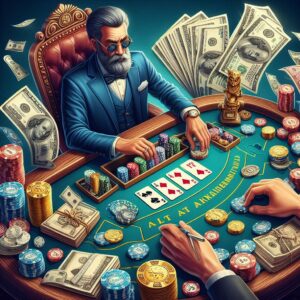Casino poker is not just a game of chance but a complex skill set that can be honed and refined. For those dreaming of transitioning from an amateur enthusiast to a professional player, From Amateur to Pro the journey involves much more than understanding the basic rules of the game. It encompasses a deep comprehension of strategy, psychology, and continuous self-improvement. Here’s a comprehensive guide to elevating your poker skills from amateur to professional.
Understanding the Foundations
Before diving into advanced techniques, it’s crucial to have a solid understanding of the game’s fundamentals. This includes the rules of different poker variants, hand rankings, and the basic strategies of betting, folding, calling, From Amateur to Pro and raising. One effective way to deepen this foundational knowledge is through consistent practice, both online and in real settings. Online platforms can be particularly useful for beginners to get a feel of the game without the intimidation of a live table.
Learning Advanced Strategies
Once the basics are secure, the next step is to learn and implement advanced poker strategies. This includes mastering the art of position, pot odds, and the expected value. Reading books by poker professionals, watching tutorial videos, From Amateur to Pro and following poker forums can provide insights and strategies that are used at professional levels. Books like Doyle Brunson’s Super/System and Dan Harrington’s Harrington on Hold’em are excellent for beginners and intermediate players alike.
Analytical Skills Development
Poker is as much about playing your cards right as it is about playing your opponents. Developing analytical skills to read situations and opponents’ behaviors is key. This involves observing patterns in other players’ actions, understanding their strategy, and predicting their moves. Keeping a poker journal to note down your play and your opponents’ significant hands can help in reviewing and improving your game strategy.
Emotional and Financial Management
The transition from amateur to professional poker is not just about skill enhancement but also about managing emotions and finances effectively. Emotional control or maintaining a poker face is essential in not giving away your hand through your expressions or reactions. Financial management involves setting a bankroll, understanding the stakes, and knowing when to step up or step down in limits. Professional players often suggest having at least 6 months of living expenses saved up before considering turning pro, to cushion against any potential losses.
Practice, Practice, Practice
Like any other skill, perfection in poker comes with practice. Participating in local tournaments, visiting casinos to observe and play at live tables, and playing online with various competitors can help sharpen your skills. It’s also beneficial to play against opponents who are better than you so you can learn from their strategies and gameplay.
Networking and Mentorship
Networking with other poker players can provide insights and learning opportunities that books and videos cannot. Joining a local poker club or online communities can open doors to mentorships and discussions with experienced players who can provide guidance, advice, and support.
Staying Updated
Poker is an ever-evolving game with new strategies, theories, and mathematical elements continuously developing. Staying updated with the latest trends and discussions in the poker world is crucial. Subscribing to poker magazines, following professional players on social media, and participating in poker forums can help keep you informed and ahead in the game.
Conclusion
Turning professional in casino poker requires more than just understanding the game; it demands dedication, continuous learning, and strategic foresight. By building a strong foundation, learning from the best, managing your resources wisely, and keeping yourself immersed in the poker community, you can significantly improve your chances of success. Remember, every professional was once an amateur, and with the right approach, you too can make this exciting transition.


